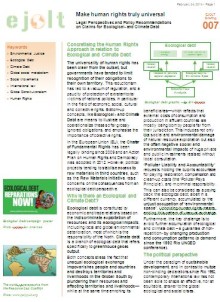
The universality of human rights has been clear from the outset, but governments have tended to limit recognition of their obligations to their own territory. This reductionism has led to a vacuum of regulation, and a paucity of protection of extraterritorial victims of national policies, in particular in the field of economic, social, cultural and collective rights. Bottom-up concepts, like Ecological – and Climate Debt are means to illustrate and operationalize these so far grossly ignored obligations, and emphasise the importance of collective rights.
These are our policy recommendations:
End the accumulation of ecological debt through coherent public policymaking.
• Ensure transparency , accountability and liability for, environmental implications of economic and sectorial policies with European monitoring, including:
– yearly policy coherence checks of EU policies affecting global sustainability;
– a revision of the EU trade policy (multilateral and bilateral trade agreements) and investment strategies in order to more insistently restrict unjust exchanges, the undercutting of social and environmental standards and the erosion of democratic decision-making by investment protection agreements, including binding investor-to-state dispute settlements outside the legislative system;
– a review of the European Sustainable Development Strategy (EUSDS) to emphasise Europe’s global responsibility;
– a revision of the Common Agricultural Policy to strengthen food sovereignty, promote shorter production chains, support fair trade and small scale farmers, as well as to increase organic and permaculture practices;
End the accumulation of ecological debt
• Establish procedures to control operations of European companies abroad by:
– holding them liable and accountable for violations of economic, social, cultural and collective rights, and obliging them to respect national laws and international norms, regarding environmental protection and biodiversity conservation and human rights protection.
– improving liability and accountability regarding the predatory actions of European companies in relation to host countries’ environment by establishing universally applicable mechanisms, facilitating access to justice in Europe to affected individuals and communities, and promoting action on the ground through procedures such as enforcement and mediation, and
– making damage to global commons an offense under European and international law.
Integral reparations for the accumulated ecological debt:
• Establish programs of restoration of and compensation for environmental damage caused by the activities of EU and Member State jurisdiction, in democratic and participatory processes with local communities as the main beneficiaries.
• Increase the financial commitment of the EU in global sustainability policies, especially by supporting the Climate Adaptation Fund, and similar initiatives, based on a participatory process with the victims.
• Initiate innovative new funding mechanisms like the Financial Transaction Tax or a Footprint Tax, and ban tax havens.
• Set up a specific “Green Revolving Fund” that will use the money for implementation of outreach projects that eliminate ecological debt on local levels.
Stop ecological debt through recognising it in legal and political terms:
• Strong implementation of Principle10 of Agenda21 Agenda (Cfr: Aarhus Convention).
• Establish an International court on environmental crimes.
• Recognise, punish and end ecocide.
• Capping the use of resources, absolute decoupling and achieve fair distribution of wealth within the limits of the planets carrying capacity.
Read more in the 4 page EJOLT briefing on international law and ecological debt.

The project ENVJUSTICE has received funding from the European Research Council (ERC) under the European Union’s Horizon 2020 research and innovation programme (grant agreement No. 695446)